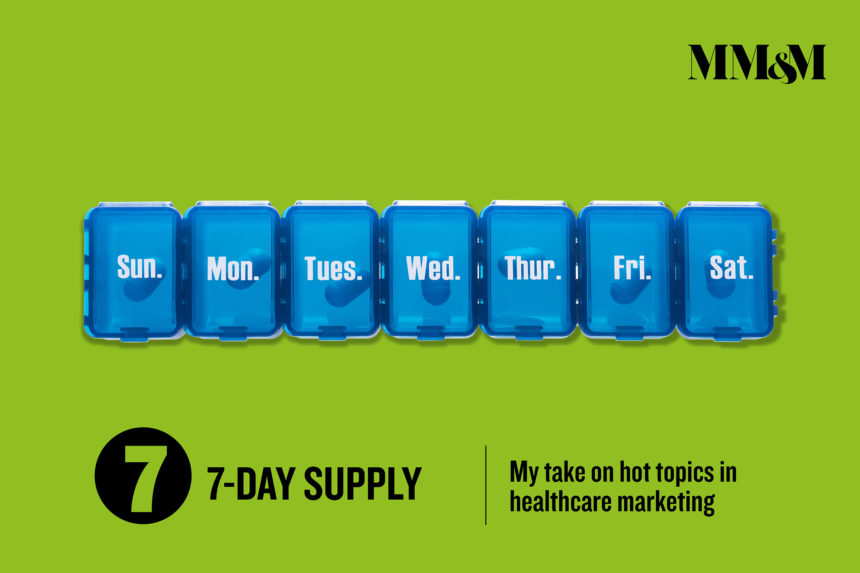Numerous drug makers publicly expressed solidarity with Black Americans in the wake of the killings of George Floyd, Ahmaud Arbery and Breonna Taylor. Now, they’re tweaking their media mix to ensure that environments where their ads appear align with those stances.
Thirty-nine biopharma brands paused Facebook and Instagram ad campaigns on either Friday Juneteenth or the ensuing weekend, per data compiled by ad-tech firm AdComplyRx. And some are mulling whether to join a July ad boycott against the social network that was recently called for by civil-rights groups in protest of what the groups say is Facebook’s lack of progress policing hate speech and misinformation.
The biggest of the Juneteenth weekend boycotters, Novartis saw more than 10 of its brands interrupt digital ad runs.
“We did pause paid campaigns on Facebook for Juneteenth out of respect for the [#BlackLivesMatter] movement as well as respect for the history of the day,” a Novartis spokesperson explained. In regards to the upcoming Facebook boycott, she added, “we are currently evaluating and analyzing the situation.”
Most striking about the Juneteenth boycotters was that, for the most part, small pharma was not among them – Genentech and Amgen ranked second and third, respectively, on the list of companies with the most brands to pause ads on the social networks, according to a report released on Thursday by AdComplyRx. Brands that did so reflected a wide breadth of therapeutic categories, from oncology, neurology and dermatology to cardiology and respiratory.
Also remarkable is the speed with which the Juneteenth boycott came together – less than a week after the #StopHateForProfit campaign, backed by a coalition including the NAACP and the ADL, began running a full-page ad in the LA Times calling for July’s full-month boycott.
Their media moves proved temporary. All 39 brands returned to the social networks the following Monday, June 22, said Ian Orekondy, CEO of AdComplyRx, which tracks about 300 pharma brands on social media. He added that, in the case of the upcoming July boycott, a corporate-level stance may be more likely than a brand-level one.
“We’ve seen statements from pharma company CEOs in solidarity with the Black Lives Matter movement,” Orekondy said. “Now that the Facebook boycott is upon us, I wouldn’t be surprised to see them weigh in as well.”
Following the spate of killings of Black people by law-enforcement officers, CEOs from several drug makers spoke out publicly decrying police brutality and systemic racism. Many added statements to their websites and social channels, and made sizable donations to non-profits. The industry itself has seen its overall reputation improve markedly in the eyes of the general public during the COVID-19 pandemic.
This wouldn’t be the first time pharma companies have fled a social network due to brand safety. GlaxoSmithKline and Johnson & Johnson were among the U.S. companies reported to have pulled their YouTube advertising in 2017 following an investigation by the Times of London into the propensity of ads to run alongside extremist content on that social network.
A source from the agency Good Apple said the upcoming boycott is expected to gain more traction than the one against YouTube, with a number of large advertisers in the pharma space either participating or addressing the movement. The agency is helping clients plan for that scenario, the source added, by advising them on diversifying their media mix and suggesting alternative platform partners to Facebook.
Is industry’s newfound social activism a sign it’s ready to shed its traditionally conservative reputation? Orekondy said he’s hesitant to label this such a tipping point.
“Given the category, we’re not hearing directly from brands,” he said. “They’re taking a very conservative stance and don’t want to be on the wrong side of any public criticism for brands that did not stand in solidarity with the movement.”
In other words, the Juneteenth pause may not necessarily be indicative of a trend toward pharma brand activism as much as a signal of an increasing tendency for marketers to pay attention to brand safety in the current environment.
Don’t look for big pharma to start acting like outdoor apparel firm The North Face, which was the first of a slew of outdoor firms pledging to suspend paid advertising on Facebook-owned properties indefinitely. “We’re not seeing that from pharma just yet,” said Orekondy. “The short-term nature of the current pause is somewhat of a clue as to how brands may behave in July. They may sit out in July and resume in August.”
Nor, for that matter, are life-science CEOs expected to take a cue from the chief executive of Ben & Jerry’s, who told the Wall Street Journal that the ice cream brand is considering joining the July boycott while pushing its media partners to take further action on systemic racism.
“We believe that corporate statements and corporate giving is not enough,” said Jabari Paul, who heads the social justice team at Ben & Jerry’s, during a session at this week’s Cannes Lions Live virtual event. “We work to leverage the full arsenal of our business tools, from our marketing capabilities to our shops to our in-house talent, who can curate content for storytelling, to adding capacity to our NGO partners and helping build their campaigns, especially when it seems they’re at watershed moments and can win with a little added support.”
The question remains whether the monthlong Facebook boycott will attract widespread support within pharma. So far, companies haven’t jumped in with both feet.
A spokesperson for Genentech, the drug maker which saw the second-highest number of brands go silent last weekend, said the big biotech’s social-media policy calls for pausing content and promotion across its corporate channels during times of a “high-profile tragedy, national emergency and whenever space is needed in the social media landscape for critical news and important conversations.”
Is this such a time? “We are reviewing information on the July ad boycott,” the spokesperson said.







